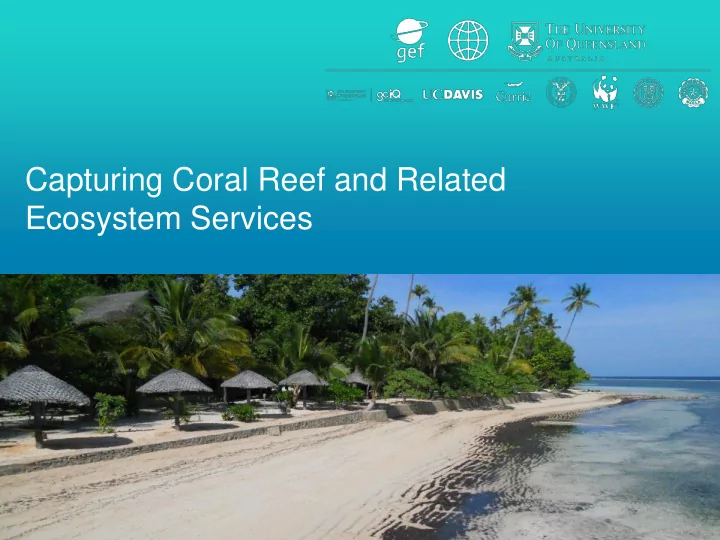

Capturing Coral Reef and Related Ecosystem Services
What are ecosystem goods and services? • Provisioning • Regulating • Cultural • Support
Benefits that people get from nature
Why value ecosystem services? A. National wealth accounts (alongside other forms of capital, e.g., minerals, human, agriculture) B. Understanding trade-offs C. Incorporate into Marine Spatial Planning to minimise conflict and improve benefits to people
What is CCRES? CCRES is a technical assistance project that will help coastal communities to secure their future economic and ecological wealth. Develop the tools and knowledge to support decision-making and new opportunities for business development.
Sustainable development challenges Discounting the future Limited understanding of trade-offs Lack of business innovation
Project Components I. Quantifying the value and market potential of coral reef and mangrove ecosystem services II. Generating robust local economies that capture and sustain marine ecosystem services III. Promoting behavioural change through outreach, decision support and regional learning IV. Project Management
I. Quantifying the value and market potential of coral reef and mangrove ecosystem services reef crest MANGROVES SEAGRASSES CORAL REEFS
Effect of reef health on fisheries productivity What is the value of a management action relative to cost? Productive Degraded
Effect of reef health on dive tourism How much are people willing to pay to access high quality reefs?
II. Identification of Business Opportunities Sediment Ecosystem Service reaching reef Sediment - entering lagoon + Mangrove area Delay Delay - Delay lagoon reef crest - Demand for Business Opportunity timber and fuel (Farm forestry + Reef quality and visibility timber and charcoal Balancing businesses) Loop + Delay + + + Attractiveness Immigration Tourism Tourism to tourists Delay
CCRES Project roll-out Feb 2014 to June 2015 July 2015 to 2017 Surveys, data collation July 2017 to 2018 Stakeholder workshops Stakeholder feedback Review of existing Business toolkit Business model businesses development Inputs to marine Valuation studies Early results from spatial plan Connectivity and marine initial models reserve design Outreach tools framework developed and dissemination YEAR 1 & 2 YEAR 3 & 4 YEAR 4 & 5
Who will benefit? • Provincial, municipal government agencies and decision-makers (e.g. PAMB, planning officers, fisheries and tourism officials) • Local businesses and communities • Information and decision-support toolkits for use at the local, national, regional and global levels
Project deliverables • Models for valuation of ecosystem services • Improved planning framework – optimal outcomes for multiple objectives • Business decision toolkit • Tools and information for incorporation into planning processes
Outcomes • Robust economic valuation of coastal natural resources is enhanced • Ecosystem services trade-offs are understood for planning purposes • Improved spatial planning • Ability to scale up or replicate across country and region
Linkages, Opportunities & Challenges • Global Linkages • Regional • National and sub-national • Local • Scaling up and replication Opportunities • Integration of tools, models and information across the projects • Building a regional platform of KM • Access to integrated networks and champions/leaders • Timing is right – people want tools for planning decisions • Achieving uptake of the tools, models and Challenges information by beneficiaries e.g political will and ownership • Replication and scaling up • How do we get GEF / WB projects talking and utilising the information
More information: Melanie King Project Director CCRES Global Change Institute The University of Queensland P: +61 (7) 3443 3122 M: +61 (0) 412 952 220 E: m.king4@uq.edu.au W: www.ccres.net
Recommend
More recommend